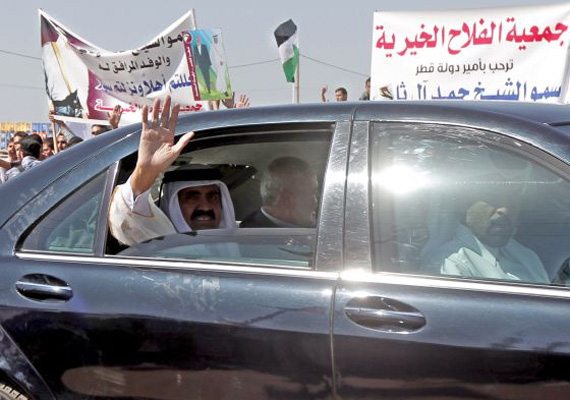On 16 October, Qatar (dubbed as a foreign policy “rising star” in the Arab World, as I will analyze over the next weeks) announced the launching of a $254 million plan to “rebuild and modernize Gaza”, the biggest injection of aid the territory has received since the 2008 war with Israel. However, for Gaza remains under a controverted blockade, it seems the implementation of the scheme will need the cooperation of both Israel (who partially lifted the blockade in 2010) and Egypt (who has shown a somewhat incoherent stance concerning the famous tunnels), as they will have to allow the entrance of building materials and heavy machinery into the strip (instead of resorting to smuggling, like Palestinians in the Strip had to do before). The plan is aimed at improving Gaza’s economic situation, badly damaged after the war and under the blockade: it will create thousands of jobs (the territory’s unemployment amounts to approximately 30% of the population, and is one of the main reasons of what some have called a “Palestinian Spring“), valuable indispensable infrastructures (particularly regarding education and health) will be built, and electricity shortages will be alleviated.

Ruling party Hamas (still figuring on the terrorist organizations’ black list of most Western states) has warmly welcomed this step as “a first drop of rain”. Indeed, the political standing of the Islamist movement will undoubtedly benefit from the plan. Over recent months, much has been said about its rapprochement towards other political movements, particularly towards Egypt’s Muslim Brotherhood (they have been the main supporters of an eventual “Palestinian Reconciliation“), and its consequent widening rift with Syria and its staunchest patron, Iran (longstanding enemy of both Qatar and Saudi Arabia). To that effect, Qatar’s step could represent the first step towards the end of Hamas’ (and thus Gaza’s) isolation.
In order to uphold his country’s stance, the Emir of Qatar Sheik Hamad bin Khalifa Al-Thani visited the Palestinian territory on 23 October, thus becoming the first Head of State to pay a visit to Gaza Strip since Hamas won the 2007 elections that led to a war between the main Palestinian factions – Hamas itself and Fatah. The Qatari Delegation entered Gaza through Egypt (the latter accepted to open Rafah’s border crossing for that purpose) and was received by scores of with people waving Qatari and Palestinian flags. As The New York Times reports, Hamas Prime Minister Ismail Haniya told the visitor: “today you are a big guest, great guest, declaring officially the breaking of the political and economic siege that was imposed on Gaza”; “today, we declare the victory on this siege through this blessed, historic visit”.
However, the visit has deeply upset the Palestinian Authority, and particularly his President Mahmoud Abbas, that clearly emphasized on Al Quds “we call on the Qatari prince or his representative to visit the West Bank too!”. The visit has also stressed the ongoing (irreconcilable?) differences between both factions, and thus jeopardised the chances of a reconciliation agreement being signed anytime soon, even though the authority called on Palestinian leaders to come to terms, for the deepening abyss is “more painful than the Israeli aggression” (maybe he was hinting the resumption of negotiations towards a Doha Agreement II?). To some accounts, the visit even overrides the Palestine Liberation Organization’s legitimacy as the sole legitimate representative of the Palestinian people.
It seems the visit has also infuriated Israel’s authorities, though that’s not big news: apparently, Yigal Palmor, a spokesman for Israel’s Foreign Ministry, declared that the emir had “thrown peace under the bus”. Some have even dared to draw a connection between the visit and yesterday’s events, whereby dozens of rockets were launched from Gaza into Israel. The latter counterattacked resorting to airstrikes, and four Palestinian militants were killed.


